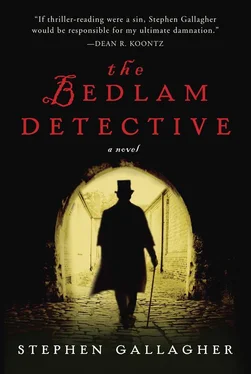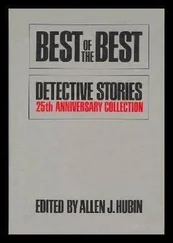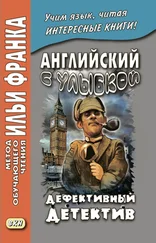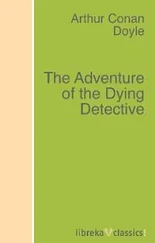Stephen Gallagher - The Bedlam Detective
Здесь есть возможность читать онлайн «Stephen Gallagher - The Bedlam Detective» весь текст электронной книги совершенно бесплатно (целиком полную версию без сокращений). В некоторых случаях можно слушать аудио, скачать через торрент в формате fb2 и присутствует краткое содержание. Жанр: Исторический детектив, на английском языке. Описание произведения, (предисловие) а так же отзывы посетителей доступны на портале библиотеки ЛибКат.
- Название:The Bedlam Detective
- Автор:
- Жанр:
- Год:неизвестен
- ISBN:нет данных
- Рейтинг книги:5 / 5. Голосов: 1
-
Избранное:Добавить в избранное
- Отзывы:
-
Ваша оценка:
- 100
- 1
- 2
- 3
- 4
- 5
The Bedlam Detective: краткое содержание, описание и аннотация
Предлагаем к чтению аннотацию, описание, краткое содержание или предисловие (зависит от того, что написал сам автор книги «The Bedlam Detective»). Если вы не нашли необходимую информацию о книге — напишите в комментариях, мы постараемся отыскать её.
The Bedlam Detective — читать онлайн бесплатно полную книгу (весь текст) целиком
Ниже представлен текст книги, разбитый по страницам. Система сохранения места последней прочитанной страницы, позволяет с удобством читать онлайн бесплатно книгу «The Bedlam Detective», без необходимости каждый раз заново искать на чём Вы остановились. Поставьте закладку, и сможете в любой момент перейти на страницу, на которой закончили чтение.
Интервал:
Закладка:
“Thank you,” she said, and squeezed his hand before she stepped around him to leave.
FORTY-THREE
On her way home that evening, Evangeline stopped at a post office and spent a penny-farthing on a letter card to inform her employers of a continuing indisposition. If they suspected her, let them dismiss her. She might forgo their good references, but she had wits enough to get around the problem without resorting to forgery.
The next day, she met Sebastian Becker at Waterloo Station and they made their second journey out to Broadmoor.
The same deputy superintendent met them in the carriage yard between the gates, and from there they passed on into the asylum proper. The enclosing wall was topped with spikes and broken glass. Within it stood a central hall with residential wings to either side of it, and a terrace walk for fresh air and exercise. One wing contained a women’s prison, where it was said that most of the inmates had been committed for the murder of their children.
Somerville was waiting in his cell with the door open. This time he seemed pleased to see them. The tale that he had begun in reluctance had become his unburdening.
Sebastian said, “Are you ready for us, Doctor?”
“I believe I am,” Somerville said.
He began-
I can’t say what it was-grief, fever, some parasitic invasion from her dousing in the river-but before long both mother and son were dying together. I was tempted to believe that the boy was dead already, rotting and breathing in some collapse of the natural order. Neither could be moved. The woman threw convulsions, and screamed if anyone touched her.
Since Sir Owain never speaks of his wife now, I shall.
I cannot say I knew her. No one on the expedition did. Most thought her aloof, and some were critical of her for bringing a child into a hostile wilderness without any grasp of what life in a wilderness entailed. But to my mind, her only crime had been to obey her husband, whose determination to treat this far-off place as but a distant corner of his own domain had led to all their sufferings.
He had to know it. When a man who demands his own way in all things is faced with the disastrous consequences of his actions, he has to know who brought them on. But can a man’s mind bear up under such knowledge? I don’t believe that it can. I stand before you as a living example. I may present myself in a rational manner, but I have found myself capable of acts outside my own control. Sir Owain is no different. And I believe we saw the proof of this in the days that followed.
At night, we heard those animal sounds outside the camp again. Sir Owain took his hunting rifle, and with no thought of personal danger he struck out into the darkness.
“Show yourself!” he’d call out. “You won’t have them! Don’t think you can hide from me!” And we heard him for some time after that, as he stumbled deeper and deeper into the jungle.
That became a routine for the next few days. I don’t believe that Sir Owain slept at all. By day he sat in the tent between his dying wife and child. At night he was out there at the first sound, blaming all of his ills on that which he could not see, seeking to confront and defy it, but never being given the chance. The rifle was always in his hand, and all of us stayed out of his way; no one wanted to be mistaken and shot.
He came back to the camp on the second morning, after roaming abroad all night, and tried to tell me a tale.
“Somerville,” he said. “You must listen. You must. It was a revelation. I’ve had a revelation.”
He was wild-eyed, and close to the brink of madness. He spoke of a confrontation with the beast that had been following us and that threatened all our lives. But the details kept changing, as if he were speaking of a dream and did not realize it.
He saw it now, he said. We had ventured into the midst of a land where creatures roamed unseen, where all the things that threatened us had forms and names but stayed beyond human perception.
“So …,” I said. “What exactly did you see?”
“Nothing!” he said excitedly. “Because they’re only there when you don’t look!”
I told him that he was making no sense.
“They’re waiting,” he insisted. “When my guard’s down, that’s when they’ll strike.”
His wife and child slipped away that afternoon, within half an hour of each other. The first I knew of it was when Sir Owain closed up the tent and went to sit by the river. His hunting rifle was in his hand. He stood it upright with the stock against the ground and the barrel pointing up at the sky.
Everyone looked to me. I entered the tent and checked both bodies for life. When I came out, the others were watching and the news must have been written on my face. I sensed a ripple pass through the camp. Not of sorrow, but of relief. It was done. Now we could leave.
I walked over and sat by Sir Owain. I eyed the gun and tried to judge his mood. He was gazing out at the spot where the two rivers met, where turbulence had capsized his vessel. I said nothing. It was minutes before he spoke.
He said, “Were they in any pain? Do you think?”
“You saw them,” I said. “They were sleeping.” And then: “We need to think about moving on.”
“One of the boats can serve as a funeral barge,” he said. “This must be done with all possible dignity.”
It took me a moment to register what he was saying.
“No, Owain,” I said then. “You can’t take them with you. We’re not yet halfway home. There’s no dignity in what a few days in this heat on the river will make of them. Do I need to explain?”
“What’s my alternative?”
“You’ll have to bury them here.”
“No!”
“If the very idea is too painful then you can leave it to others.”
“I won’t leave them in the dirt of some foreign land.”
“Then they’ll rot in your arms. Is that what they’d want?”
It was harsh, but it did the trick. He closed his eyes, and all the fight seemed to go out of him.
“No,” he said. “I can’t leave it to others. This is my family. I shall be the one to deal with it.”
He got to his feet. He took a deep breath and he straightened his back. Then he turned and walked back toward the camp, calling everyone together.
He stood before us all, and made a speech.
“I’ve decided that we shall continue downriver,” he said, “as soon as my wife and child have received a fit and proper burial, as befits good Christians in a heathen land. I trust no one considers this unreasonable.”
All eyed the way that he hefted his hunting rifle, and agreed that, despite dwindling supplies, creeping sickness, uncharted hazards, and invisible beasts, this was not at all unreasonable.
“Good,” he said. “I shall begin my design for the tomb.”
He had the surveyors looking for the best site. He had it cleared of vegetation, and set our camaradas to dig the hole. Wherever they dug, after a foot or two the hole would fill up with water. The second choice of site was no better. The men worked, wanting to be done with this and on their way.
Meanwhile, Sir Owain had our Indians hauling flat stones out of the river, including one so heavy that it took all of them working together. Once it was on the bank, he had them hammer in wedges to split it. With a charcoal stick, he drew his funereal designs on each flat surface and set them to chipping away at the rock, flaking it down so that his designs slowly rose up in relief.
I managed to catch him alone for a moment. I said, “Owain, I’m concerned. Someone’s moved our supplies.”
He seemed unworried. “No one’s taking more than his share,” he said. “I’ve made sure of that.”
Читать дальшеИнтервал:
Закладка:
Похожие книги на «The Bedlam Detective»
Представляем Вашему вниманию похожие книги на «The Bedlam Detective» списком для выбора. Мы отобрали схожую по названию и смыслу литературу в надежде предоставить читателям больше вариантов отыскать новые, интересные, ещё непрочитанные произведения.
Обсуждение, отзывы о книге «The Bedlam Detective» и просто собственные мнения читателей. Оставьте ваши комментарии, напишите, что Вы думаете о произведении, его смысле или главных героях. Укажите что конкретно понравилось, а что нет, и почему Вы так считаете.












